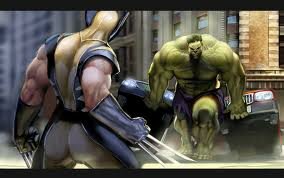Listen:
Copyrights offer a shield cast by the law that allow creators to protect their ideas. If others feel like stealing an idea, then the one with the copyright and subsequent licensing for said idea is in for a huge payday. Names, phrases, slogans, recipes, and even characters are subject to copyright law.
With the formalities out-of-the-way, let’s ponder the idea of a rumor thrown out in my last Science class. One of my students raised his hand and inquired about the Avengers. “Teacher, do you know about their next movie?” Alex asked after I had told him I knew who the Avengers were.
He then went on to announce to the class that Spider-Man would be in the next Avengers film, and that he would make a cameo at the end. This sent my Science class, who were evidently not doing their worksheet on combustion and other forms of energy, into a frenzied debate. I told the students to calm down and I reassured Alex that Spider-Man would not show up in Avengers 2: Age of Ultron.
However, this statement sent the students who agreed with Alex into another debate. Their primary disbelief arose from reading the story arc in Marvel comics where Peter Parker reveals himself as Spider-Man to the public after a chat with Tony Stark. This begins the Civil War plot. They also referred to Wolverine being a member of the Ultimate version of the Avengers, as is Spidey, which the recent Disney/Marvel movies are all based on. Another student took that gem and reminded everyone that Wolverine fights Hulk, and so the class fell into a haze of orgasmic movie-desires. Those poor, poor kids.
Unfortunately, such things cannot be. Yet, it is not only the kids that want to see this, but many older fans as well. Can you imagine the reaction to Logan walking through a wilderness as the Hulk jumps in front of him on the silver-screen? Furthermore, applause would be guaranteed if a web-blast splattered across Ultron’s face at the peak of an inevitable battle. The Ultimates could unite under the same tent, and fantastic arcs like House of M, Civil War, and even Marvel Zombies could potentially be fast-tracked.
So, what’s the problem? Just do it:
It’s never that easy. Currently, Spider-Man is under license to Sony Picture Entertainment. Marvel sold the licensing agreement to them in 1999, and this resulted in Sam Raimi’s trilogy as well as the newer Spider-Man reboot, where he battled the Lizard. Thus, Marvel owns the copyrights to Spider-Man, but they do not have the license. As a result, Marvel still pulls in tons of cash from Spider-Man toys and clothes, but Sony rakes in the cash from film profits.
As long as a Spider-Man film is made every few years, no matter the quality, and the licensing fees are paid to Marvel, then Sony has all the say towards Spidey and his amazing friends and enemies. The influx of cash to both parties is the primary reason why neither Sony nor Marvel are in a rush to end their licensing agreement. Sony also holds the licensing rights to the Fantastic Four and the X-Men, which is why we keep seeing Wolverine movies, and a new Fantastic Four film is on the horizon.
In terms of risk, Marvel has absolutely none, as all it has to do is make toys and t-shirts and let the cash roll in. Any and all financial risks are taken on by Sony, because if their Spidey, X-Men, or Fantastic Four films flop, then they take a hit but are still required to pay Marvel for the license. In short, Marvel has a win-win situation.
Furthermore, Marvel was only able to get back the licensing rights to Iron Man in 2005. New Line Cinema had held those rights for several years, but had remained unsuccessful in launching a film. This was also the case for the rights to use the Hulk. The rights for Bruce Banner and his alter-ego reverted to Marvel because Universal Pictures was unable to produce principal photography in a timely manner. This triggered a clause that allowed Disney/Marvel to keep licensing and use both the Hulk and Iron Man in the Avengers film. Otherwise, the Avengers may have been led by Ant-Man and, perhaps, Dr. Strange would have replaced the Hulk. In addition, Marvel’s current roster of characters currently numbers over 18,000, which shows how many options for substitutes there are.
How did DC and WB solve this problem?
No, Black Manta was not in the cartoon series Justice League: Unlimited. The copyright for this character belonged to DC, but they had sold the license to this character for the TV Pilot of the live-action Aqua-Man series. The series never caught on, and Black Manta was never used. Regardless, since DC had sold the license they created a new character named Devil Ray (voiced by Michael Beach), who looked and behaved exactly like Black Manta on Justice League: Unlimited. The legal rights for both sides were obeyed, and fans didn’t seem to mind.
(Devil Ray on the left replaced Black Manta on the right due to licensing agreements)
Would this work in a film? Spider-Man has a variety of similar heroes in the comics. The Scarlet Spider immediately comes to mind. In the comics, Ben Reilly, Peter Parker, and Joe Wade all wore this costume at different times. But, Disney/Marvel would either have to establish this character or create another young scientist who moonlighted as a superhero in New York to take his place. By DC standards, Spider-Man could become Arachnid Man or Web-Man and the Civil War plot could carry on.
However, the difference between Spider-Man and Black Manta is massive. Spider-Man is a household name, and one just can’t bullshit one’s way through the tent-poles of Hollywood’s most sacred corporations. More specifically, not many people know who Black Manta is or what his role in the DC Universe involves. Spider-Man and Iron Man, on the other hand, have become the equivalent to DC’s Superman and Batman; the big dogs.
Riddle me this: What has the same name, powers, but is being portrayed by multiple studios?
The current cast list for Avengers 2: Age of Ultron lists Aaron Taylor-Johnson of Kick-Ass fame as Quicksilver. Quicksilver is Magneto’s son, and he is instrumental in many of Marvel’s comic arcs. He is similar to the DC’s Flash in that his super-powers are speed based. Both he and the Flash can run at speeds so great that they can bend time. Thus, with Disney/Marvel introducing alternate realities for the Age of Ultron, he is an essential figure.
Even though Quicksilver is slated to become an alley of the Avengers under Disney/Marvel licensing, he is also scheduled to appear in Bryan Singer’s X-Men: Days of Future Past under Sony’s license. Sony’s version of Quicksilver is being debuted by Evan Peters of American Horror Story fame. So, what’s the deal?
Both copyright and licensing agreements have loopholes and carefully written defaults. Thus, as both of these films aim to expand the Marvel universe into other realities, it can be surmised that minor-characters (who may later become massively popular, like Quicksilver) who overlap into multiple Marvel teams may be open for use to different studios. For instance, not only has Quicksilver been a member of both the Avengers and the Ultimate version of the Avengers, but he has also appeared as a member of X-Factor as well as the leader of the X-Men (in a role that is usually occupied by Cyclops) in the Age of Apocalypse comics. Thus, if the language for the licensing agreements for both minor X-Men and Avengers characters are going to overlap anyway, no matter how much we don’t understand copyright law, then why can’t it apply to alternate or shared versions of major characters like Spider-Man or the Fantastic Four?
This begs the question of whether comic fans are being ripped-off. Reaching financial agreements to bypass both copyright and licensing shields under U.S. law is not easy. Again, it is not a risk to Marvel, because they will get paid regardless of the law. Most likely, as the first Avengers entry brought in over $600,000,000 domestic, before raking in over $800,000,000 overseas, there is no reason for Disney/Marvel to play nice. Quicksilver’s different casting decisions can evidently be side-stepped by sighting the different realities created by Ultron’s time-altering powers as well as by the future X-Men having the technology and mutants (Bishop, Shadowcat) to bend and change time. If this is the case, then it is very similar to the whole Devil Ray and Black Manta scenario, except Disney/Marvel and Sony studios, unlike DC and Warner Brothers, were smart enough to legally maintain and share the name of the character.
Still, Quicksilver and Black Manta are currently bit-players. Spider-Man and the Fantastic Four are immortal and coveted internationally. Could alternate versions of them appear under Disney/Marvel and Sony? What is the legal mumbo-jumbo that the studios have on their sides to stop such films like Avengers: Civil War from being made? We don’t know and, as childish as it sounds, it is not fair.
As far as we can tell, Marvel’s no-risk money and Sony’s profits from crappy films are both controlling and denying the actual films we all want to see. They have foolishly waged a civil war between popular Marvel characters to prevent the Civil War fans long for.
 Chris Patton is the writer for Laser Lemming’s movie review blog entitled The Cursed Hero. Read his rodent blog here: https://laserlemming.com/category/blogs/cursedhero/
Chris Patton is the writer for Laser Lemming’s movie review blog entitled The Cursed Hero. Read his rodent blog here: https://laserlemming.com/category/blogs/cursedhero/










